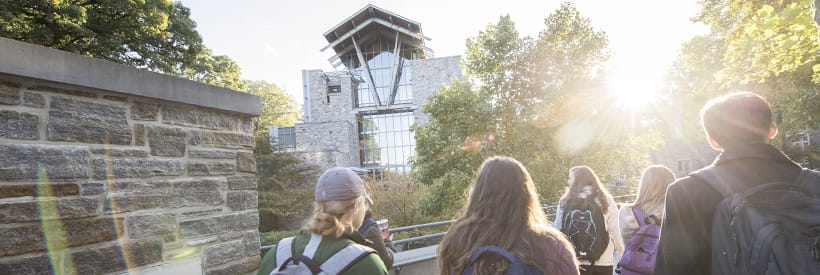
Office of Student Integrity and Restorative Justice Practices Updates
To report a violation of Loyola University Maryland policies, including hazing behavior and off-campus concerns, please submit this reporting form.
If you are involved in the student integrity process and have questions, please reach out to us at studentintegrity@loyola.edu.
Rooted in the Jesuit, Catholic tradition and guided by the ideal of cura personalis—care for the whole person—Loyola University Maryland affirms the inherent dignity and sacred worth of every individual. We believe that true formation—intellectual, ethical, social, and spiritual—can only flourish within a community grounded in mutual respect, accountability, and the pursuit of justice and reconciliation.
At the heart of our approach to student behavior and community life is restorative justice. This commitment reflects our deep belief in the possibility of healing, transformation, and renewed relationship when harm occurs. Restorative practices allow us to confront conflict and misconduct not with punitive instincts alone, but with a commitment to dialogue, reparation, and the rebuilding of trust. This is especially aligned with our Jesuit call to be people of reconciliation—actively working to restore right relationships with self, others, and God.
A caring and just university community is sustained by the active participation of all its members—students, faculty, staff, and administrators—in fostering a culture of honesty, integrity, responsibility, and concern for the common good. At Loyola, students are called to conduct themselves in a way that upholds the well-being and dignity of all community members. When behavior disrupts this vision, our response is rooted in both accountability and accompaniment—seeking not only to address harm but to facilitate meaningful growth and repair.
Our Community Standards, Honor Code, and other institutional policies reflect these principles and are designed not only to clarify expectations, but to guide processes that educate, restore, and reintegrate. Loyola’s student integrity process, grounded in restorative justice, provides space for students to reflect on their choices, understand the impact of their actions, and take steps to make amends. When harm has been caused, we emphasize processes such as restorative circles and conferences, which empower those affected to speak their truth and participate in collaborative solutions.
Being a part of the Loyola community is both a privilege and a responsibility—one that asks each of us to be stewards of a safe, inclusive, and caring environment. As we seek to form individuals committed to justice and the service of others, we recognize that learning through challenge, failure, and reconciliation is a vital part of Jesuit education. Our hope is that through restorative practices, every member of our community experiences not only accountability, but also the grace of renewal.
Learn more about our Community Standards
Mission
The Office of Student Integrity and Restorative Justice Practices at Loyola University Maryland advances a campus culture rooted in the Jesuit values of cura personalis, reconciliation, and a deep respect for the dignity of every person. We approach student integrity as an opportunity for education, reflection, and transformation—believing that accountability, when paired with compassion, leads to meaningful personal growth and stronger community connections.
Central to our mission is the use of restorative justice practices such as restorative circles and conferences, which allow those impacted by harm to engage in dialogue, take responsibility, and collaborate in repairing relationships. Through these processes, we strive to move beyond punishment toward healing and reintegration, nurturing a community where students learn to live with integrity, respond to conflict with empathy, and contribute to a more just and compassionate world.